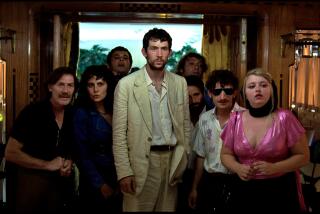Movie review: ‘The Skin I Live In’
The plot of Pedro Almodóvar’s new feature, based on Thierry Jonquet’s taut suspense novel “Mygale,” pivots on an act of cruelty both barbarous and scientifically refined. The action spinning out from this crime involves a series of rapes, actual and imagined, and suicide attempts, successful and not. But “The Skin I Live In” is no gloomfest, and not merely because most of the grisly bits take place off-screen.
With his expected flair, the Spanish filmmaker has concocted a heady blend of beauty and repulsion, Antonio Banderas inspiring the requisite loathing as the story’s debonair mad genius.
If theory ultimately outstrips drama in this semi-serious inquest into identity, gender and love, the filmmaking is often thrilling. The homey gazpacho blender of Almodóvar’s comic “Women on the Verge of a Nervous Breakdown” has given way to the sci-fi sterility of a centrifuge, and he achieves a far more dynamic synthesis of concept and kicks than in his previous film, the labored “Broken Embraces.”
In his first work with the director in 20 years, Banderas plays plastic surgeon and high-functioning opium smoker Robert Ledgard. His House Beautiful compound in Toledo, Spain, bearing the deceptively lyrical name El Cigarral (the Orchard), contains a fully equipped medical clinic — the better to conduct experiments that cross bioethical lines. Specifically, Robert has been perfecting an artificial skin, his motivation the terrible burns that his wife, now deceased, suffered in an accident.
Robert’s first human subject is Vera (the exquisite Elena Anaya, shot to look flawless), a prisoner at El Cigarral who hasn’t succumbed to Stockholm syndrome. She practices yoga in her windowless room, dressed in a beige body stocking like a superhero biding her time. Robert watches her on a wall-size video surveillance screen, another piece of oversize art in his well-appointed home. The frame-within-the-frame zoom images of her are among the film’s most striking.
In a sly way, the movie is about the birth of an artist, the work of Louise Bourgeois and Alice Munro informing and provoking Vera’s sculptures, eyeliner-pencil graffiti and, best of all, her violent deconstruction of pretty dresses. A ballet of fabric, scissors and a state-of-the-art vacuum cleaner, set to a frenzy of strings, is a potent and playful scene using one of the strongest sections of Alberto Iglesias’ exhilarating score.
A time-tested perversity of the story is that Banderas’ ultra-possessed Robert is an artist too, a Dr. Frankenstein stitching together an involuntary costume of skin for his victim. Blood cells bloom like flowers of evil under his microscope lens, and he uses revenge on behalf of his mentally ill daughter, Norma (Blanca Suárez), as an excuse to set in motion his scientific dream.
The action reels back six years to reveal a fateful encounter between Norma and Vicente (a terrific performance by Jan Cornet), who has a talent for window design (more clothes!) and a youthful lack of focus. In a benign version of Robert’s surveillance screen, Vicente’s mother (Susi Sánchez) watches him through a wall cutout in her boutique.
Though Almodóvar has retained the creep factor of his source material, he hasn’t fully embraced its darkness. The movie ends where another Almodóvar piece might begin, with a family reunion at once strange, matter-of-fact and hopeful. The family angle, especially an emphasis on the maternal, is one key way the book has been Almodóvar-ized.
Along those lines, the character of Robert’s faithful housekeeper takes on greater importance. Marilia (Marisa Paredes) endures an unwanted visit from her criminal son, Zeca (Roberto Álamo). Besides injecting a too-assertive variation on the skin/clothing theme — he’s badly scarred and wearing a silly tiger costume for Carnival — he disrupts the self-contained household and kicks the story toward its climax.
Later, when Marilia gathers up bloodstained sheets, death and childbirth fuse into one jolting image. But the secret she spills feels more like a melodramatic joke than a drama-shaping revelation.
Cinematographer José Luis Alcaine employs a more subdued palette than is usual for Almodóvar. Even so, the hues that punctuate the canvas, like the red of those sheets, have the intensity of a Fauve fever dream.
There’s plenty to savor in this film — not least a dusky-voiced performance by singer Concha Buika. But whether you’re smiling or shuddering, this is finally a movie of ideas. Those ideas, disturbing and provocative, are translated into a number of unforgettable visuals, even as the drama that propels them comes to life only intermittently and with a wink.
More to Read
The biggest entertainment stories
Get our big stories about Hollywood, film, television, music, arts, culture and more right in your inbox as soon as they publish.
You may occasionally receive promotional content from the Los Angeles Times.






